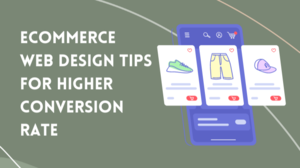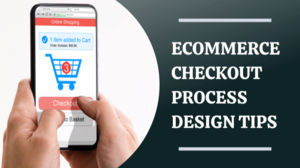Best Enterprise Ecommerce Platforms to Look for in 2025
Are you planning to take your online business to the next level?
If you are juggling thousands of SKUs, expanding into a new global market, or striving to deliver lightning-fast shopping experiences, picking the right enterprise ecommerce platform will definitely be the game-changer you need.
After all, these platforms are designed to handle complex business needs. However, it gets tough to choose the right platforms, as there are too many options available in the market.
So, let's take a look at some of today's best enterprise ecommerce platforms so that you can determine which software could be the right choice for your business. We will explore their key features to figure out why top-performing brands trust them to power their online success.
1. Shopify Plus
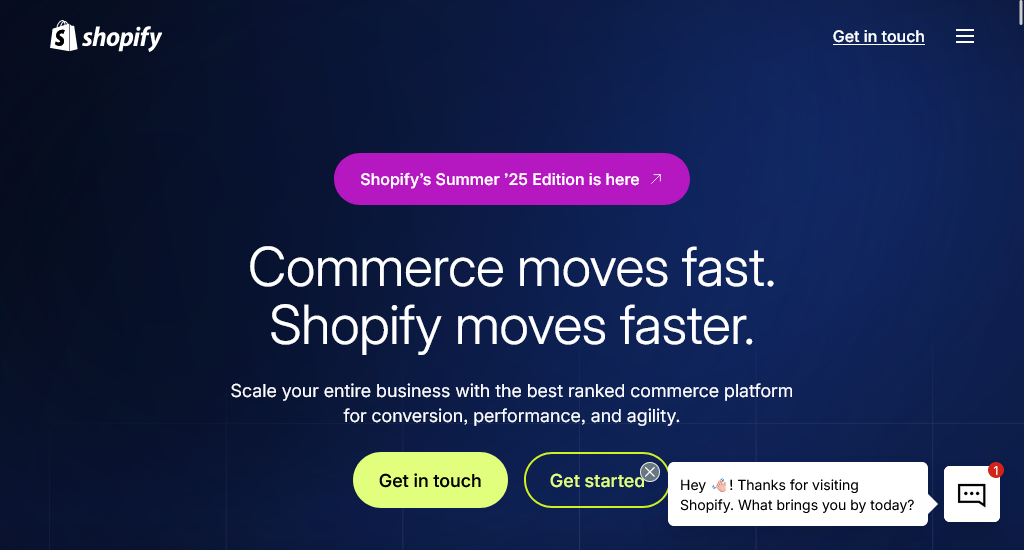
Simply say, Shopify Plus is the enterprise-level offering of Shopify. It is specially designed to meet the demands of high-growth and large-scale businesses. As a fully hosted SaaS platform, it can easily handle any technical heavy lifting while businesses can focus on growth.
Key features:
High scalability with cloud infrastructure
Shopify Plus is capable of handling over 10,000 transactions per minute. This makes it ideal for high-volume brands and peak sales periods. The cloud-based architecture ensures performance stability.
Custom checkout with script editor
With the built-in script editor, businesses can easily create tailored checkout experiences by customising shipping methods, discounts, and payment options. This feature is usually not available on many SaaS platforms.
Shopify flow for automation
Shopify Plus users get access to use this automation tool that they can use to streamline tasks like inventory management, customer tagging, and more.
Built-in multi-currency tools
This feature makes it easier for enterprise merchants to manage their international storefronts and localised shopping experiences.
Pros
- It is built to handle high traffic and transaction volumes.
- It comes with all the strong SEO tools that are needed to drive organic traffic to the store.
- It supports multi-currency, international storefronts, and other features like wholesale channels and custom pricing that allow businesses to expand into new markets easily.
Cons
- Being a SaaS platform, it comes with limited freedom to customise.
- If you are not using Shopify payments, you have to pay a fee for every transaction.
- For the enterprise-level customers, there is limited customer support available.
Pricing
The pricing plan starts at USD 2300 per month on a 3-year term and USD 2500 on a 1-year term.
2. BigCommerce

With its Open SaaS architecture, BigCommerce comes with an all-in-one toolbox that assists businesses in setting up their shop online and growing. It provides great product management, inventory control, SEO-friendly tools, and more to get more traffic for businesses. Mostly, its user-friendly interface and extensive customisation options are what distinguish it among ecommerce platforms.
Key features:
Multi-storefront functionality
It is one of the most valuable enterprise features of BigCommerce. Brands can manage multiple storefronts using just a single backend.
Specialised B2B edition
BigCommerce offers this for complex business needs. It includes features like bulk pricing, custom catalogues, quote management, credit limits, and more.
Enterprise-grade security
BigCommerce offers enterprise-grade security, including Level 1 PCI compliance, regular platform audits, and 99.99% uptime annually.
Integrated omnichannel commerce tools
BigCommerce allows seamless omnichannel selling across platforms such as Amazon, Facebook, Instagram, Google Shopping, and more.
Pros
- BigCommerce provides transparent pricing with no transaction fees regardless of the payment gateway used.
- It serves excellently for both B2B and B2C merchants.
- It provides a huge number of features that end up reducing reliance on third-party apps.
- One can get direct access to a team of dedicated professionals who assist them with the site's build, launch, and growth.
Cons
- The free themes are limited in variety and design quality.
- As there is a wide range of features, those who are new to enterprise platforms might face a learning curve.
- Smaller businesses might find BigCommerce too complex and feature-heavy.
- BigCommerce often upgrades the plan automatically as the annual sales increase, which can lead to higher costs.
Pricing
There are four pricing plans available.
- The Standard plan is for individuals and small brands and is available at $29 per month if billed annually.
- The Plus plan is for ambitious small businesses that cost $79 per month.
- The Pro plan is for fast-growing businesses that cost $299 per month.
- There is a Custom plan as well, which is ideal for established businesses.
3. WebCommander
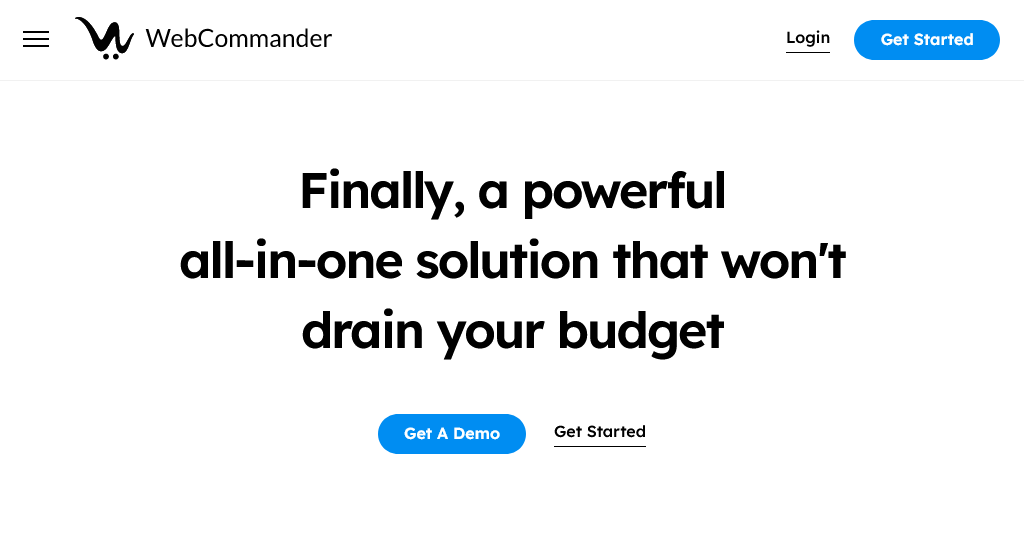
This platform is designed to help small and medium-sized businesses build and manage their online stores. It comes with a wide range of built-in features, including customisable templates, marketing tools, inventory management, and multi-store capabilities.
Key features:
Customisable website builder
The platform offers pre-designed blocks, templates, image sliders, and an intuitive drag-and-drop editor that users can use to design fully responsive websites.
Pricing and loyalty tools
Users can set retail and wholesale pricing, offer multi-level discounts, run loyalty programs, and more.
Powerful SEO & marketing automation
There are built-in SEO tools, structured data mark-up, meta tags, sitemaps, and automated email marketing available.
Real-time shipping integration
Users can easily integrate with major shipping carriers and track live shipping rates and deliveries, print labels, and more directly from the dashboard.
Pros
- It offers a variety of mobile-friendly templates that anyone can use without any coding knowledge.
- The integrated POS and inventory management allow seamless syncing between online and offline sales.
- It allows users to manage multiple online stores using just a single admin panel.
- There are many built-in marketing tools, including SEO tools, newsletter integration, discount codes, and social sharing features.
Cons
- WebCommander doesn't have a wide marketplace of third-party plugins and extensions.
- The huge number of advanced features might leave the users in confusion who do not have any prior ecommerce experience.
- It doesn't have a large global community or tutorials.
Pricing
There are four pricing plans.
- Startup is free.
- The other three are Professional ($15 AUD/month)
- Premium ($350 AUD/month), and
- Enterprise for custom needs.
4. Salesforce Commerce Cloud
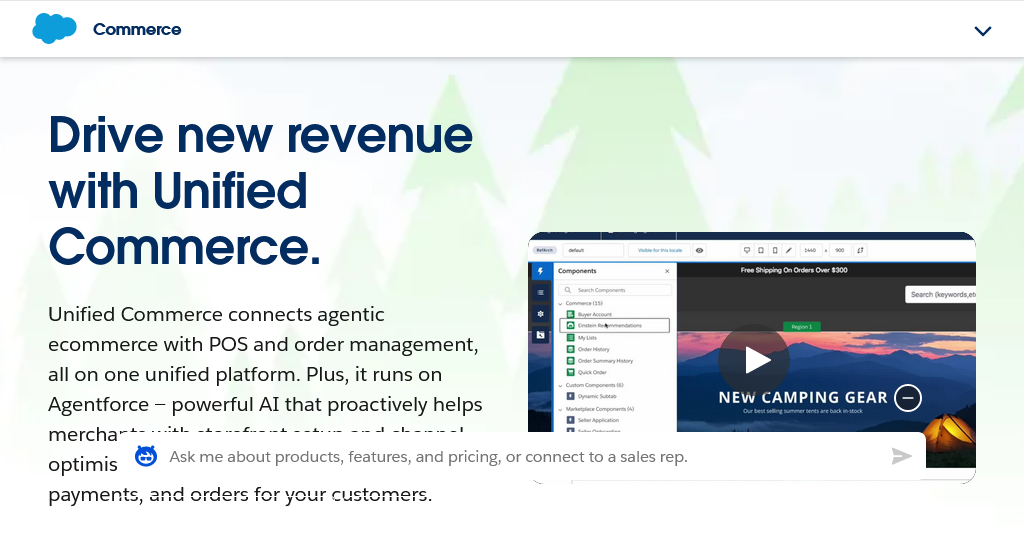
This is another powerful enterprise-level ecommerce platform that is designed to help large businesses. One of its unique functionalities is that it is backed by the trusted Salesforce ecosystem that lets brands unify customer data while driving smarter sales and making decisions utilising AI and automation.
Key features:
AI-powered personalisation
It has a built-in AI engine that provides real-time personalisation such as recommendations, search optimisation, and more without the help of third-party AI tools.
Salesforce ecosystem
It easily connects with other Salesforce tools like CRM, Marketing Cloud, and Service Cloud.
Advanced customisation
Salesforce offers flexible customisation of storefronts, catalogues, and customer journeys to support global growth and high-traffic events.
Built-in ecommerce and marketing tools
There are many powerful features such as advanced pricing, CRM, product catalogue management, analytics, and more.
Pros
- Offers enterprise-grade scalability to handle complex catalogues and global rollouts.
- It is a good SaaS based solution for omnichannel needs.
- Offer options for B2C, B2B, and both B2B and DTC.
- Supports long-term engagement beyond just transactions.
Cons
- First-time users might find the depth of the platform a bit overwhelming.
- As the platform is fully cloud-based, there is no option for on-premise deployment.
- Businesses that are skipping Salesforce products might face integration issues.
- It might put restrictions on the number of API requests, connections, or the amount of data that can be handled at one time.
Pricing
The price of the Starter Suite is AU$35, Pro Suite is AU$140, and another plan is Commerce Cloud Pay-As-You-Go.
5. Adobe Commerce (Magento)
.png)
Built on an open-source architecture, Adobe Commerce allows brands to create custom shopping experiences while managing complex business needs, from multi-storefront to international operations to B2B functionality.
Key features:
Advanced B2B suite
It has built-in B2B functionality, which is specially designed for wholesale and enterprise-level commerce.
Adobe Sensei
This platform integrates Adobe Sensei, which is basically an AI and machine learning engine. It helps businesses to deliver automated and intelligent product recommendations depending on shopper behaviour, real-time data, and purchasing trends.
Multi-source inventory
It allows merchants to manage inventory in several locations.
Integrated customer segmentation
Depending on the customer behaviour, demographics, and order history, businesses can serve dynamic content and promotions tailored to each group.
Pros
- Adobe Commerce has a strong developer community who are ready to deal with any platform issues.
- Users get the flexibility to choose between cloud hosting and on-premises hosting.
- Supports robust user roles and permissions, which are ideal for businesses with large teams or multi-level user hierarchies.
- Gives businesses the freedom to build a fully custom site.
Cons
- Compared to other platforms, open source requires major developer effort.
- Upgrading to Adobe Commerce can incur extra costs from third-party apps or development.
- Due to heavy customisation, updating a store can take significant time.
- Conflicts between extensions can happen, requiring developer intervention.
Pricing
It offers two main editions: the Open Source edition and the Commerce edition.
6. Oracle CX Commerce
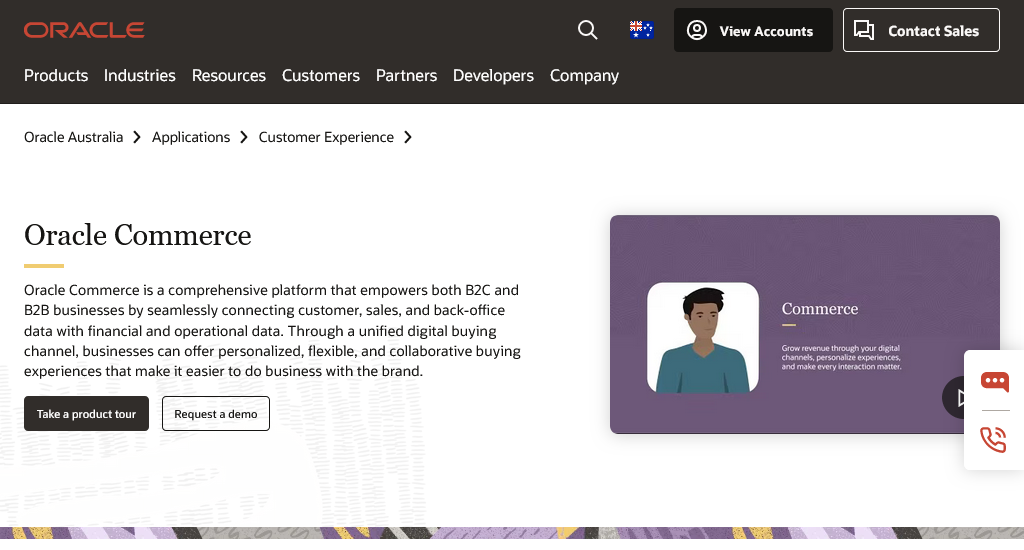
It is built on a modern API-first architecture. Oracle CX Commerce offers the flexibility needed to build a scalable and secure online storefront. This platform is renowned for its robust scalability, integration capabilities, and feature-rich offering. Enterprise businesses prefer this platform as it has an AI feature and supports multi-channel strategies.
Key features:
Built-in AI and machine learning
This platform uses AI tools to power product recommendations, personalised search results, and predictive analytics.
API-first architecture
As it is built with an API-first approach, this makes it highly flexible for headless commerce implementations and easy integration with other enterprise systems.
Dynamic experience management
This feature is ideal for fast-paced environments as it allows marketers and merchandisers to easily create, test, and launch custom content and experiences.
Multi-site and multi-brand management
With this, businesses can manage multiple storefronts, brands, or international sites using just a single backend.
Pros
- It is ideal for large enterprises that deal with high-volume traffic, global operations, or complex B2B and B2C models.
- It seamlessly works with Oracle's CX, ERP, and analytics solutions.
- It provides enterprise-level data security, privacy, and regulatory compliance, which are suitable for global brands.
- Businesses can develop personalised customer experiences using dedicated customer insights.
Cons
- The platform sometimes turns out to be complex to set up and operate.
- The licensing, implementation, and maintenance can be expensive.
- It comes with less community support than other platforms.
- This platform requires skilled developers due to extensive customisation and integration.
Pricing
The pricing of Oracle CX Commerce depends on feature selection, deployment model, and usage volume.
7. Etsy
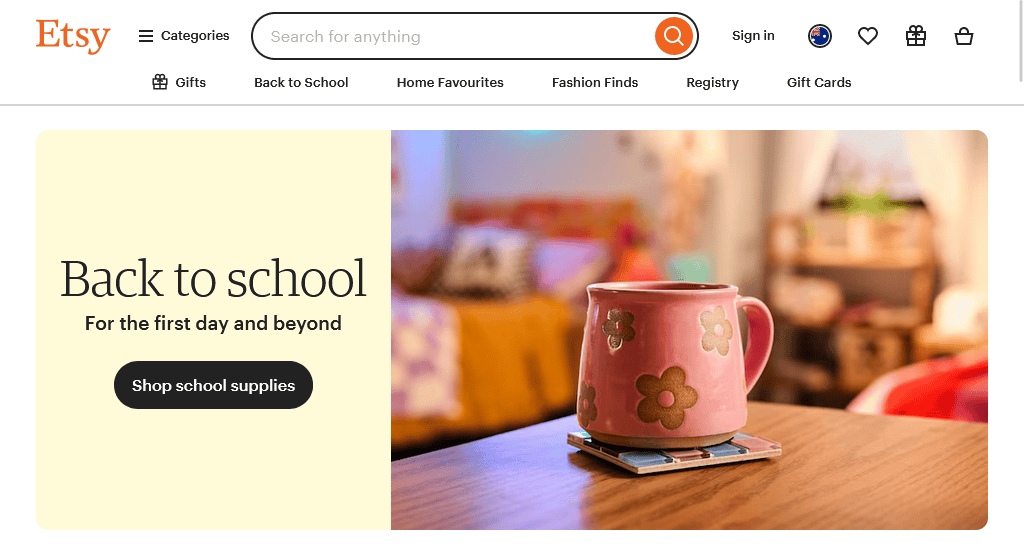
This is a popular global marketplace. Mostly, creative entrepreneurs and small businesses can use this to showcase their products to a worldwide audience. Sellers can easily manage their shops and grow their brand using the user-friendly platform.
Key features:
Direct navigational tools
Users can enable a "Make an offer" button to negotiate prices privately on select listings.
Wide-advertising program
This platform helps businesses in advertising as it automatically promotes items on external high-traffic sites. And it takes a commission on resulting sales.
Localised event and community tools
The Etsy app comes with "Etsy Local". It lets buyers discover nearby makers or local artisan markets.
Plus subscription feature
Sellers can get access to advanced shop customisation tools or restock request notifications using Etsy Plus.
Pros
- Etsy benefits sellers with global marketplace exposure.
- With no coding or web development knowledge, sellers can easily use Etsy's ready-to-use tools and storefronts.
- Global sales become easier with Etsy as it provides efficient international selling tools.
Cons
- Compared to other platforms, the storefront's design is restricted.
- There is always a possibility of unexpected changes in policies, and the violations can lead to penalties.
- With too many competitions, there can be issues with visibility.
- Sellers get less access to customer data, which can affect building long-term relationships.
Pricing
If applicable, Etsy charges a one-time shop setup fee. It takes an AU$0.31 listing fee per item alongside a 6.5% transaction fee.
Wrapping up
Now that you know better about some of the most used enterprise-level ecommerce platforms, choose the one that you can rely on to deal with your comprehensive online store. Find out the best platform.




![How to Start an Ecommerce Business in Australia [2023 Guide]](/template/e27cf56f/images/resource-blog-right-img1.png)
